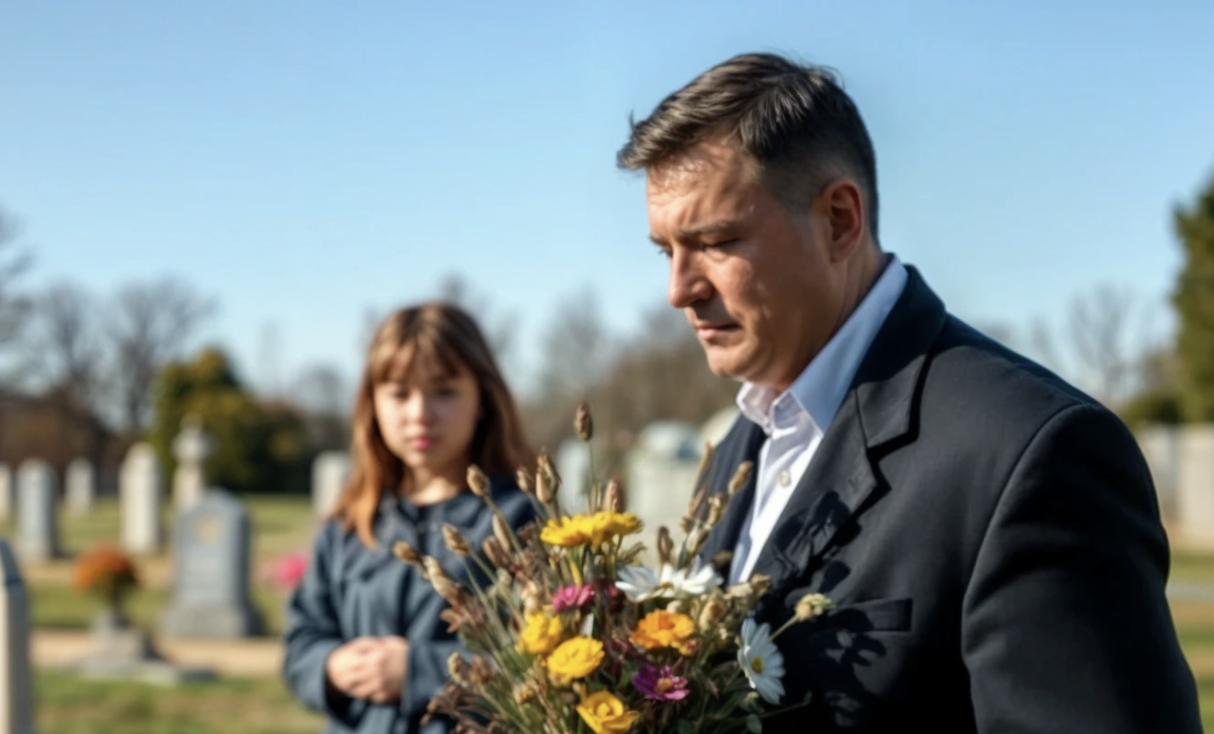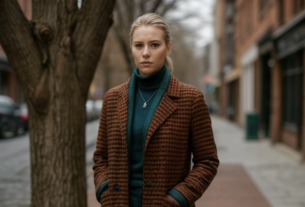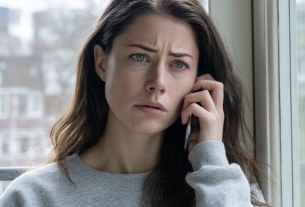Matvey stopped the car at the cemetery gates and took a deep breath. Lord, how many times had he planned to come here? How many times had he postponed it “for later”? When his mother was alive — there was never any time. After her death — it was as if there was no place left for the past at all.
And yet, it was long overdue to wake up. To understand that this whole world he had so carefully built around himself was just a facade. Not a single word, not a single gesture had any real foundation. Ironically, he was even grateful to Natasha — now his ex-wife — for destroying that fragile house of cards. Just bam — and it all collapsed! Such a perfect-looking family life, such “genuine” relationships with friends… But in reality — his wife, his best friend, and all those friends who knew and kept silent. It was not just a collapse. It was a blow from which Matvey still had not recovered.
Right after the divorce, he left for his hometown. Eight years had passed since he buried his mother. Eight years! And not once had he found time to visit the grave. Only now, when nothing good was left in life, he realized a simple truth: his mother was the only person who would never betray him.
He married late — he was thirty-three, and Natasha was only twenty-five. He was proud of her, like a trophy. She was beautiful, elegant, “socialite,” as it seemed then. Now he remembered her face twisted with rage, the words she threw at him: that she had hated him their entire short life together, that every night with him was torture for her. He still didn’t understand how he could have been so blind. She cried, begged for forgiveness, said she felt lonely… But as soon as the word “divorce” was said — the mask fell. There she was, the real one.
Matvey got out of the car, taking a large bouquet of flowers from the back seat. He walked slowly, looking down at his feet. The path must have been overgrown. He hadn’t even come when the monument was being installed — everything was done online, remotely. Like a symbol of his whole life: everything from a distance, everything unreal.
The fence was clean. The monument too. The flowers were fresh, the soil neatly loosened. Someone was taking care of the grave. Probably one of his mother’s old friends. Although… apparently, the son had no time for that.
He opened the gate and whispered:
— Hello, Mom…
His throat tightened, his eyes burned. Matvey did not expect to cry. He was a businessman, cold-blooded, calculating, used to keeping a straight face. And now he was crying like a child. Not trying to hold back the tears. They were freeing, washing the soul of everything connected with Natasha, with betrayal, with pain. As if his mother really was nearby, stroking his head and whispering: “It’s okay, son… Everything will be alright.”
He sat for a long time. Silently. But spoke mentally. Remembered childhood: how he fell, scraped his knees, and mother applied iodine, repeating: “It will heal, no scar will remain.” And it really healed. Over time. And each time the pain became lighter. And mother always added: “You get used to everything, except betrayal — never.”
Now he understood every word she said. Back then, they seemed just tender phrases, but they turned out to be wisdom.
Paying the neighbor to look after the house wasn’t a problem, but how long could he keep the house locked up? He smiled, remembering how he met the neighbor. He was unwell, it was hard. And her daughter — Nina — greeted him with such warmth… They started talking, and everything somehow fell into place. He left early in the morning, leaving a note about where to put the keys. Maybe, from her point of view, he acted unfairly. But he promised nothing. Everything was by mutual consent. She had just divorced her tyrant husband and told him how hard it was. They were both lonely. So they got together for a while.
— Mister, will you help me?
Matvey turned sharply. Before him stood a little girl about seven or eight years old, holding an empty bucket.
— I need to bring water to water the flowers. Mom and I just planted them, but today mom got sick. It’s hot outside — they will die! But the bucket is too heavy. I can’t carry it myself. Just don’t tell mom I came here alone. If I carry it little by little, she’ll still notice I was gone.
Matvey smiled:
— Of course, show me where to go.
The girl ran ahead. Talkative, lively. In five minutes he learned almost everything: how mom didn’t listen to advice and drank cold water, how she got sick, how they came to the grandmother’s grave who passed away a year ago, and how grandma would have scolded her for that. The girl had been studying in school for a whole year and was determined to get only A’s — and in the future wanted to graduate with a gold medal!
With every word, Matvey felt lighter. Children are a real miracle. He thought about how he wished to have a normal family: a wife who loves, and a child who waits for you at home. His Natasha was like an expensive doll — beautiful but soulless. Children were not even discussed. According to her, “you have to be a complete fool to lose your figure for a squealing lump.” They lived together for five years. And now he understood: he had no warm memories of that marriage.
He set down the bucket, and the girl carefully began to water the flowers. Matvey looked at the monument and froze. The photo was of… the neighbor. Nina’s mother. The grandmother of this little girl.
— Zinaida Petrovna was your grandmother?
— Yes! Do you know her? Although why do I ask — you were at Grandma Zoya’s!
Matvey glanced at the girl:
— So you… live here with your mom?
— Well, yes! I told you — mom doesn’t let me go to the cemetery alone.
Matvey looked at the child in confusion. So Nina had come back here, and she had a daughter. And he didn’t even know… Wait. He didn’t even know how old Masha was. Maybe the child was born later?
The girl quickly said goodbye and ran off, reminding him not to make her mom worry.
Matvey returned to his mother’s grave, sat down, and thought. Something had changed inside. Probably now Nina was taking care of the house herself. And he was paying her, although before he thought he was paying her mother. But, in general, who he paid wasn’t important.
Then he drove to the house. His heart tightened. Everything was as before — as if his mother would appear on the porch any moment, wipe tears on her apron, and hug him. He stayed in the car for a long time. Mother did not appear.
But in the yard, a surprise awaited him: everything was neat, beautiful, flowers planted. Nina really cared for the house. He would definitely have to thank her.
The house was also clean and cozy, as if someone had just left and would be back soon. Matvey sat at the table, stayed a little while, but didn’t linger — he had to settle things with the neighbor, and then he could rest.
The door opened — it was Masha.
— Oh, it’s you! — she whispered, putting a finger to her lips. — Just don’t tell mom we met at the cemetery!
Matvey showed his lips zipped, and the girl laughed:
— Come in!
— Mom, uncle Matvey came to us! — Masha shouted inside the house.
Nina appeared in the hallway and froze, shrinking from surprise.
— Is that you…?
Matvey smiled:
— Hi.
He looked around — no husband, no sign of him.
— Matvey, sorry… I didn’t tell you about mom’s death. Work in the city is bad, so I’m taking care of the house myself.
— My condolences, Nina. And about the house — thank you so much. When I come in — it’s like mom just stepped out for a minute.
— Are you staying long?
— For a few days.
— Are you going to sell it?
Matvey shrugged:
— Haven’t thought about it yet. Here, take this — it’s for your good work. Like a bonus.
He put a thick envelope on the table.
— Thank you, uncle Matvey! — Masha exclaimed happily. — Mom has wanted a new dress for a long time, and I — a bicycle!
Matvey laughed. Ah, a familiar character!
In the evening, he realized he was sick. His temperature rose. He found his mom’s thermometer, measured — the fever was high. He didn’t know any medicine, so he texted the neighbor’s phone. Only now did he know that Nina was replying.
“What do they take for high fever?”
Ten minutes later they were already at his place.
— Lord, why did you come into the house? I infected you!
— Come on, you’re sick — why did you come here?
— It’s okay, I’m already better!
Nina handed him pills, Masha brewed tea.
— You’ll burn yourself! — Nina worried.
— Who, Mashka? Never! She’s a jack-of-all-trades!
Matvey smiled. And suddenly a light bulb went off in his head — like when, as a child, his brain suddenly found the right answer to a difficult problem.
— Nin…
The woman looked scared:
— What?
— When was Masha born?
Nina slowly sat down:
— Why do you need to know?
— Nina!
She turned to her daughter:
— Mashenka, run to the store, buy a couple of lemons. And something to drink.
— Okay, mom!
As soon as the girl left, Nina spoke:
— Matvey, let’s agree right away: Masha has nothing to do with you. We don’t need anything, we have everything. Forget it.
— What do you mean “forget it”? Is it true?
— Nina, do you even understand what you’re saying? Why didn’t you say? Why did you hide?
Matvey jumped up.
— I decided to keep the child myself. You weren’t involved — that’s why I didn’t tell you. I never thought you’d show up here. And definitely never thought it would matter to you.
— So you think I wouldn’t want to know I have a daughter?
Nina shrugged:
— I got over it. As you see.
Matvey was silent. He was shocked. All these years he had lived a fake life. But real happiness — here it was, nearby. In the face of a little girl and a woman he apparently had always loved.
— Matvey? — Nina called worriedly. — What will you do? Please, don’t tell Masha anything. You’ll leave — and forget. It will hurt her, she’ll start waiting…
— No! That won’t happen!
— Understand me…
— I don’t even know yet what to do.
That night he dreamed of his mother. She was smiling, hugging Masha and saying she had always dreamed of such a granddaughter.
In three days Matvey was leaving. Nina sat at the table, listening to him:
— I’ll sort things out and come back. In a week, maybe a little more. Not just like that. I want to bring you back. I promise — if nothing works out, I won’t say anything to Masha. But I’ll always help. Nin… Is there any chance? A chance for family, for happiness?
She wiped a tear and whispered:
— I don’t know…
He returned three weeks later. He didn’t come to his own house, but to Nina’s. In his hands — huge bags with gifts for Masha and her mom.
— Hello!
Nina was sewing something by the window, heard his voice, and barely smiled:
— You came…
Masha came out of the room:
— Hello, uncle Matvey!
Nina stood up:
— I thought it over. And… Mashenka, I want to introduce you to your real dad.
Matvey dropped the bags.
— Thank you…
They left a week later. Both houses were put up for sale — they decided to start life anew. Masha still mixed up words, calling him “dad” sometimes, then again “uncle Matvey.” And he just laughed, hugged them both, and believed that now everything would be exactly as it should be.



